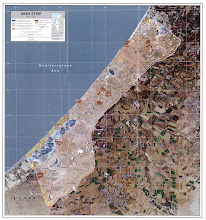In true Trumpian fashion, after saying he wants out, he has contradicted himself. Just the other day, standing with France President Emmanuel Macron, he said, “We want to leave a strong and lasting footprint” in Syria. By what authority? Congress has not authorized it, and no authority exists under the UN bylaws. Obviously, the Syrian government has not invited the U.S. presence.
The AP reports that Macron said that "he and Trump now agree that the Syria problem involves more than Trump’s priority of ridding the country of Islamic State extremists." Translation: they want regime-change in Syria, something Trump campaigned against. The AP commented, "The two leaders indicated that they see Syria as part of a broader problem of instability in the Middle East, which includes Iran’s role in Syria and Iraq." I'm sure Russia is on their minds as well. The AP added, "That kind of strategic thinking bears little resemblance to Trump’s words in late March when he said it was time to leave Syria to others."
Sowing further confusion, according to the AP, "The White House stressed that Trump’s plans had not changed and he still wanted U.S. forces to 'come home as quickly as possible.'" Right.
Anyone who sees coherence here isn't paying close enough attention. But who expected coherence from Trump?
And of course Trump has twice launched cruise missiles at sites in Syria after undocumented claims that Assad allegedly used chemical weapons against civilians in a Damascus suburb. Other U.S. military action has taken the lives of Russians, which puts the lie to the claim that Trump is Vladimir Putin's puppet.
It's worth noting that both alleged chemical attacks occurred shortly after Trump declared his intention to withdraw U.S. military forces from Syria. This naturally raises the possibility that those attacks, if chemical weapons were actually used, were perpetrated by forces that wanted the Americans to stay -- that is to say, the attacks were not committed by Assad but by those who are trying to overthrow him and want American help. That would be al-Qaeda-related militants. After all, Assad is winning the civil war; at the time of the last alleged chemical attack, only one pocket of rebels remained in the suburban enclave. Why would he want to inflame world opinion, and Trump in particular, at a time like this? It makes no sense. Yes, people sometimes do things that seem to make no sense, but Assad has not acted suicidally in the past; why start when the U.S. president is talking about getting out?
Trump has never shown much understanding of the Middle East, or of anything else for that matter. During his presidential campaign he proposed restrictions on Muslim travel and even on American Muslims "until we can figure out what the hell is going on." To say such a thing in 2016 and beyond demonstrates supreme ignorance and a lack of curiosity. At least since 2001, well-informed individuals, including Ron Paul during his presidential primary campaigns, explained that U.S. intervention (such as is now occurring in Yemen, among many other places) is what inspires the wish to harm Americans. Trump would know this if he cared and was paying attention. But he does neither.
Trump might "think" (if this verb can even be applied to him) that a U.S. presence in Syria is necessary to protect the American people, but this idea has been debunked many times. U.S. brutality against Muslims is what explains Muslim violence against Americans. Intervention endangers Americans; it doesn't make them safe. If Trump believes U.S. intervention in Syria, Iraq, Afghanistan, Yemen, Somalia, Niger, etc. is necessary to prevent safe havens for terrorists, he need only do a little reading -- all together now: LOL -- to see otherwise. He could consult, for example, Scott Horton's "War Without a Rationale," in which he writes:
The September 11 hijackers, none of whom were Afghans, gained entry to the United States under regular tourist and student visas. The terrorists launched the attacks from Massachusetts, Virginia, and New Jersey. They had planned them in Malaysia, Germany, Spain, California, Florida, and Maryland.By Trump's (and many others') "logic," the safe-haven argument implies the U.S. military must occupy every country. I should be careful about giving them ideas, shouldn't I?
Trump could learn from recent history, but he has time for neither history nor learning. Nevertheless, it was intervention in Afghanistan, Iraq, Libya, and Syria that converted a small group of terrorists (see Horton) into larger, even more-militant offshoots in a variety of countries, not to mention the horrific Islamic State.
We should stop trying to figure out what Trump wants with Syria because that is a pointless exercise. All Trump wants is power and adoration. At any given moment he does whatever he believes will achieve that.
TGIF (The Goal Is Freedom) appears on Fridays. Sheldon Richman, author of America's Counter-Revolution: The Constitution Revisited, keeps the blog Free Association and is executive editor of The Libertarian Institute. He is also a senior fellow and chair of the trustees of the Center for a Stateless Society and a contributing editor at Antiwar.com.
Become a Free Association patron today!





